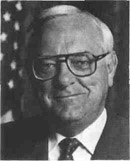|

|
NOW IS THE TIME FOR .08
By SECRETARY OF STATE GEORGE H. RYAN
|
With the General Assembly re-convening this
month, it is a good time to renew our efforts for .08. The
Legislature is moving up its deadlines for bills, and
committee hearings may be held as early as the end of
the month. So .08 is now a high priority with me, and
time is getting short.
Under a Constitutional Amendment approved by
Illinois voters in the November General Election, any
bill passed after May 31, 1995, cannot take effect until
June 1, 1996, unless the bill passed the Legislature by a
three-fifths vote.
Illinois stands to lose more than $4 million in federal
highway safety funds if a .08 law is not in effect by Sept.
30, 1996.
Municipal officials played a key role in our successful "Use it & Lose It" campaign last year, and we are
looking forward to another cooperative effort with .08.
Arguments for .08
Opponents say the difference between .10 and .08 is
negligible and that the proposal would infringe on social drinking. However, consider these facts:
• A person weighing 160 pounds would have to
consume four drinks in one hour to reach a BAC of .08.
(It would take five drinks in one hour to reach the
current illegal BAC of .10.) A person weighing 200
pounds would have to consume five drinks in one hour
to reach a BAC of .08. (It would take slighly more than
six drinks for this person to reach .10 BAC.).
• One drink equals a 12-ounce beer, a five-ounce
glass of wine or a cocktail containing one ounce of 86
proof liquor. They all have an equivalent amount of
alcohol.
• Reliable studies show that essential driving skills
are impaired at .08 BAC for all people. At .08, drivers
take too long to decide and act, motor skills (such as
braking) are impaired, and reaction time is increased
significantly.
• At .08, a person is three times more likely to be
involved in a car crash than a sober driver and 11 times
more likely to be involved in a fatal single vehicle crash.
Police officers will still need "probable cause" to
stop a vehicle and ask the driver to submit to a breath
test. So the number of DUI arrests probably would not
increase with the passage of a .08 law, but the number
of offenders convicted would.
Kemper Poll
• By a two-to-one margin, registered Illinois voters
support lowering the BAC from .10 to .08, according to
a poll commissioned by the Kemper National Insurance
Companies. The poll found that:
• A majority of 61 percent favor lowering the BAC
to .08, while only 32 percent oppose the change. Majorities of voters in all parts of the state and within all age
groups favor the proposition.
• A vast majority — 95 percent — strongly approve
of the steps the General Assembly has taken in recent
years to reduce the number of drunk drivers. Only two
percent disapprove of these actions.
Page 22 / Illinois Municipal Review / January 1995
• Fifty-six percent said a motorist who had three
drinks — or even less — in an hour should be considered
under the influence.
Illinois is at the forefront nationally in cracking
down on drunk drivers. To maintain this position, we
must join the 11 other states (California, Florida, Kansas, Maine, North Carolina, New Hampshire, New
Mexico, Oregon, Utah, Virginia and Vermont) that
have lowered the illegal DUI limit to .08.
Illinois currently receives $2.2 million annually in
federal incentive grants. But those funds will not be
available if the state does not have a .08 BAC law in
force by Sept. 30, 1996.
According to the National Highway Traffic Safety
Administration, traffic crashes are the greatest single
cause of death for persons between the ages of 6 and 32,
and nearly half of those crashes are alcohol related. At
current rates, two of every five persons in this country
will be affected by an alcohol-related crash during their
lifetimes.
In 1993, 17,461 deaths, or 43.5 percent of the 40,115
traffic deaths nationally were alcohol related. That is
one alcohol-related traffic death every 30 minutes.
Therefore, once again in 1995, I am asking the
General Assembly to pass .08 legislation. A level of .08
BAC is indeed drunk and impaired, and people at that
level have no business being on the road. This is the
message I am taking to the legislature.
The measure is endorsed by the American Medical
Association, National Safety Council, National Commission Against Drunk Driving, Mothers Against Drunk
Driving, Students Against Driving Drunk, Alliance
Against Intoxicated Motorists, Insurance Institute for
Highway Safety, and others. •
January 1995 / Illinois Municipal Review / Page 23
|